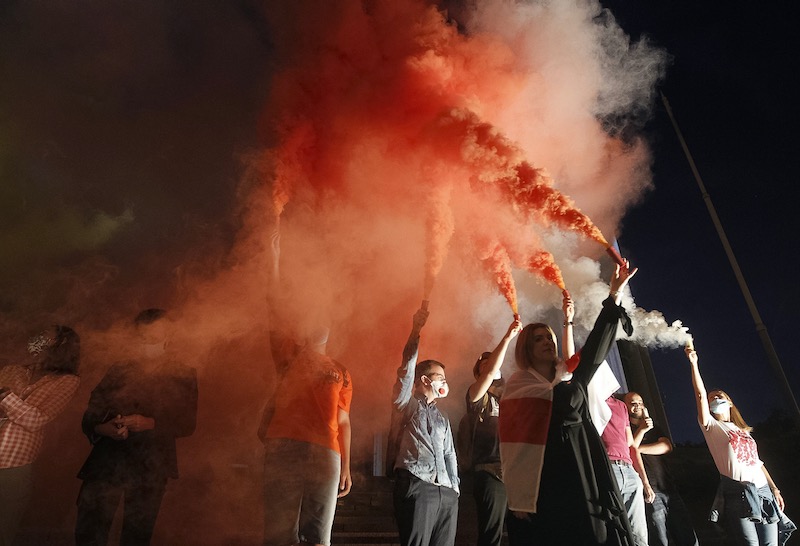The Archbishop of Minsk-Mohilev and president of the Belarus Catholic Bishops’ Conference has called for an end to the clashes occurring across Belarus following the disputed presidential election. “Let the force of argument, based on dialogue in truth and mutual love, prevail over the argument of force,” said Archbishop Tadeusz Kondrusiewicz.
On 19 August, holding a rosary, he prayed the Chaplet of Divine Mercy, outside a prison in Minsk where protesters were being held. The archbishop, who is 74 and was born in the small Belarus town of Adelsk, not far from the Polish border, was joined by local Caritas officials, religious and laity. After the vigil, the Archbishop talked to people in the street, including some who had just been released from prison. He called for the release of all protesters and urged the Minister of the Interior, Yurij Karaev, “to allow priests to visit the people detained to ensure they receive the necessary help, especially spiritual help”. He also requested a face-to- face meeting to evaluate the situation together and prevent violence. A number of released protesters made allegations of torture and ill treatment, according to the United Nations representative in Belarus.
Belarusian President Alexander Lukashenko claimed victory on 9 August saying he had garnered around 80 per cent of the vote. His claim triggered clashes between security forces and opposition supporters in which one protester was killed, more than 200 people hospitalised, and more than 1,000 detained. Unrest is being fuelled by years of political repression under Lukashenko. According to government officials theopposition candidate, Sviatlana Tsikhanouskaya won just 10 of the vote She was detained for several hours after complaining to the electoral committee, and has fled to Lithuania.
Pope Francis prayed for Belarus during his Angelus address on 16 August and appealed for dialogue. “I entrust all Belarusians to the protection of Our Lady, Queen of Peace,” he said.
The chair of the Bishops’ Conference of England and Wales' International Affairs department, Declan Lang, has expressed solidarity with protestors in Belarus. He called on Catholics to pray for democratic reform in the country, and urged the UK government to collaborate with other countries to address the human rights abuses there.
In Germany Cardinal Reinhard Marx has called on the demonstrators in Belarus to “keep a clear head” and not allow themselves to be deterred in their peaceful struggle against social grievances. “Everywhere where people rise up and defend human dignity, the dignity of life and the dignity of freedom, one becomes conscious of Easter and that includes Belarus. Easter means rising up against hatred, violence and injustice”, Marx declared in his sermon in Munich Cathedral on the Feast of the Assumption.
Archbishop Ludwig Schick of Bamberg, who is responsible for world affairs in the German bishops’ conference, told KNA on 21 August that he was in favour of a peaceful change of regime in Belarus, but underlined that there must be no bloodshed. “The struggle for freedom, truth, democracy and political change in Belarus should be supported by everyone”, he emphasised and recalled that 40 years ago the Polish Solidarity Trade Union had been founded under similar circumstances.
The bishop of Germany’s easternmost diocese of Görlitz, Wolfgang Ipolt, has appealed to all the churches in his diocese to pray for peaceful change in Belarus. He himself had experienced the peaceful revolution in the German Democratic Republic in 1989, he recalled in an interview for domradio.de. His great fear was that President Lukashenko would use the military and that there would be bloodshed.
“The people of Belarus need our solidarity and our prayers so that they can find a conciliatory way of renewing the system and society from within”, Ipolt said. He thought both the Orthodox and the Catholic Church could help to achieve a peaceful solution. Forty-eight per cent of Belarusians are Eastern Orthodox and 7 per cent either Roman or Greek Catholic.



 Loading ...
Loading ...